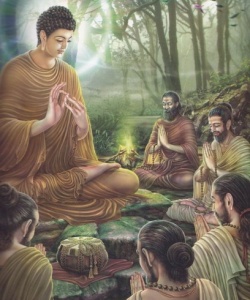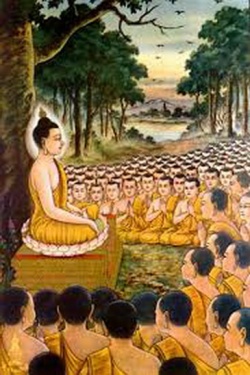Difference between revisions of "Prajna Paramita Hridaya Sutra ; Heart Of Perfect Wisdom"
| Line 8: | Line 8: | ||
[[Sariputra]], all [[dharmas]] are marked with [[emptiness]]. None are born or [[die]], nor are they {{Wiki|defiled}} or immaculate, nor do they wax or wane. Therefore, where there is [[emptiness]], there is no [[form]], no [[feeling]], no [[perception]], no impulse, nor is there [[consciousness]]. No [[eye]], {{Wiki|ear}}, {{Wiki|nose}}, {{Wiki|tongue}}, [[body]], or [[mind]]. No {{Wiki|color}}, [[sound]], {{Wiki|smell}}, {{Wiki|taste}}, {{Wiki|touch}}, or [[object]] of [[mind]]. There is no domain of [[sight]] nor even domain of [[mind]] [[consciousness]]. There is no [[ignorance]] nor is there ceasing of [[ignorance]]. There is no withering, no [[death]], nor is there ceasing of withering and [[death]]. There is no [[suffering]], or [[cause]] of [[suffering]], or cease in [[suffering]], or [[path]] to lead from [[suffering]]. There is no [[Wikipedia:cognition|cognition]], nor even [[attainment]]. | [[Sariputra]], all [[dharmas]] are marked with [[emptiness]]. None are born or [[die]], nor are they {{Wiki|defiled}} or immaculate, nor do they wax or wane. Therefore, where there is [[emptiness]], there is no [[form]], no [[feeling]], no [[perception]], no impulse, nor is there [[consciousness]]. No [[eye]], {{Wiki|ear}}, {{Wiki|nose}}, {{Wiki|tongue}}, [[body]], or [[mind]]. No {{Wiki|color}}, [[sound]], {{Wiki|smell}}, {{Wiki|taste}}, {{Wiki|touch}}, or [[object]] of [[mind]]. There is no domain of [[sight]] nor even domain of [[mind]] [[consciousness]]. There is no [[ignorance]] nor is there ceasing of [[ignorance]]. There is no withering, no [[death]], nor is there ceasing of withering and [[death]]. There is no [[suffering]], or [[cause]] of [[suffering]], or cease in [[suffering]], or [[path]] to lead from [[suffering]]. There is no [[Wikipedia:cognition|cognition]], nor even [[attainment]]. | ||
| − | So [[know]] that the [[Bodhisattva]], indifferent to any kind of [[attainment]] whatsoever but dwelling in [[Prajna]] [[wisdom]], is freed of any [[thought]] covering, get rid of the {{Wiki|fear}} bred by it, has overcome what can upset and in the end reaches utmost [[Nirvana]]. All [[Buddhas]] of {{Wiki|past}} and {{Wiki|present}}, and [[Buddhas]] of {{Wiki|future}} [[time]], through [[faith]] in [[Prajna]] [[wisdom]], come to full and perfect [[Enlightenment]]. | + | So [[know]] that the [[Bodhisattva]], indifferent to any kind of [[attainment]] whatsoever but dwelling in [[Prajna]] [[wisdom]], is freed of any [[thought]] covering, get rid of the {{Wiki|fear}} bred by it, has overcome what can upset and in the [[end]] reaches utmost [[Nirvana]]. All [[Buddhas]] of {{Wiki|past}} and {{Wiki|present}}, and [[Buddhas]] of {{Wiki|future}} [[time]], through [[faith]] in [[Prajna]] [[wisdom]], come to full and {{Wiki|perfect}} [[Enlightenment]]. |
[[File:147ages.jpg|thumb|250px|]] | [[File:147ages.jpg|thumb|250px|]] | ||
Therefore, one should [[know]] the [[Prajna paramita]] as the [[mantra]] of great [[knowledge]], the miraculous, the utmost, the unequalled [[mantra]], whose words relieve all [[suffering]]. This is [[highest]] [[wisdom]], true beyond all [[doubt]]. | Therefore, one should [[know]] the [[Prajna paramita]] as the [[mantra]] of great [[knowledge]], the miraculous, the utmost, the unequalled [[mantra]], whose words relieve all [[suffering]]. This is [[highest]] [[wisdom]], true beyond all [[doubt]]. | ||
Revision as of 01:06, 30 October 2014
Translated by Truc Huy
The Bodhisattva Avalokitesvara, from the deep course of Wisdom in Buddhism Prajna wisdom, saw clearly that all five skandhas were empty, thus sundered all bonds of suffering.
Sariputra, know then: form does not differ from emptiness, nor does emptiness differ from form. Form is no other than emptiness, emptiness no other than form. The same is true of feelings, perceptions, impulses and consciousness.
Sariputra, all dharmas are marked with emptiness. None are born or die, nor are they defiled or immaculate, nor do they wax or wane. Therefore, where there is emptiness, there is no form, no feeling, no perception, no impulse, nor is there consciousness. No eye, ear, nose, tongue, body, or mind. No color, sound, smell, taste, touch, or object of mind. There is no domain of sight nor even domain of mind consciousness. There is no ignorance nor is there ceasing of ignorance. There is no withering, no death, nor is there ceasing of withering and death. There is no suffering, or cause of suffering, or cease in suffering, or path to lead from suffering. There is no cognition, nor even attainment.
So know that the Bodhisattva, indifferent to any kind of attainment whatsoever but dwelling in Prajna wisdom, is freed of any thought covering, get rid of the fear bred by it, has overcome what can upset and in the end reaches utmost Nirvana. All Buddhas of past and present, and Buddhas of future time, through faith in Prajna wisdom, come to full and perfect Enlightenment.
Therefore, one should know the Prajna paramita as the mantra of great knowledge, the miraculous, the utmost, the unequalled mantra, whose words relieve all suffering. This is highest wisdom, true beyond all doubt.
Know then and proclaim the Prajna paramita mantra. It spells like this:
Gate, gate, paragate, parasamgate, bodhi svaha ! ( Gone, gone, gone beyond, gone altogether beyond, Bodhi, rejoice ! )
LE SUTRA DE L'ESPRIT DE LA GRANDE VERTU DE SAGESSE (Prajna Paramita Hrdaya Sutra) Traduit par Truc Huy
Lorsque le Bodhisattva Avalokitesvara accomplit profondément la grande Vertu de Sagesse, il considéra les cinq agrégats comme vides et traversa ainsi toutes les souffrances et afflictions.
Sariputra, les formes ne sont pas différentes du vide. Le vide n'est pas différent des formes. Les formes ne sont rien d'autre que le vide. Le vide n'est rien d'autre que les formes. Il en est de même des sensations, des perceptions, des formations mentales et de la conscience.
Sariputra, tous ces dharma ont l'aspect du vide. Ils ne naissent ni ne disparaissent. Ils ne sont ni souillés ni purs. Ils ne croissent ni ne décroissent. C'est pourquoi, dans le vide, il n'y a pas de forme, de sensation, de perception, de formation mentale ni de conscience. Il n'y a pas d'oeil, d'oreille, de nez, de langue, de corps ni de mental. Il n'y a pas de couleur, de son, d'odeur, de saveur, de toucher ni d'objet de pensée. Il n'y a pas de domaine du visuel et pour finir pas de domaine de la connaissance mentale. Il n'y a pas d'ignorance et pas plus de cessation de l'ignorance. Pour finir, il n'y a pas de vieillesse ni de mort, et pas plus de cessation de la vieillesse ni de la mort. Il n'y a pas de souffrance, d'origine, de cessation ni de chemin. Il n'y a pas de connaissance ni même d'obtention.
Comme il n'y a rien à obtenir, c'est pourquoi les Bodhisattva s'appuient sur la vertu de sagesse. Leur esprit ne connaît pas d'entrave, ainsi ils n'ont pas de peur. En se libérant des erreurs et des égarements, ils atteignent enfin l'ultime Nirvana. Tous les Bouddhas du passé, du présent et du futur, en s'appuyant sur la vertu de sagesse, ont obtenu le suprême et parfait Éveil.
Aussi professe-t-on la vertu de sagesse. Par un grand mantra miraculeux, par un mantra de grande connaissance, par un mantra insurpassable, par un mantra sans égal. Il supprime toute souffrance, en vérité et sans fausseté.
Voilà donc le mantra qui proclame la grande Vertu de Sagesse. Ce mantra dit:
Gate, gate, paragate, parasamgate, bodhi svaha !


